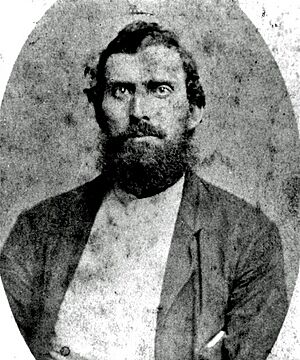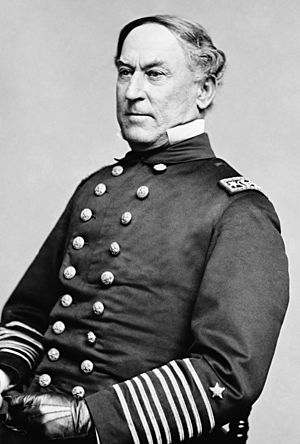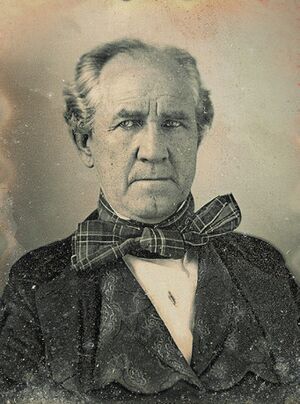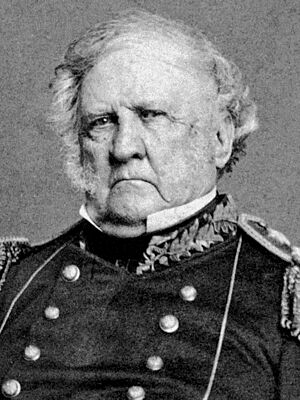Southern Unionist facts for kids

In the United States, Southern Unionists were white Southerners who lived in the Confederate States of America but did not want their states to leave the Union. Many of them fought for the Union during the Civil War. These people were also called Southern Loyalists or Union Loyalists. People who supported the Confederacy in the South sometimes called them "Tories." This was a name used for those who supported the British King during the American Revolution. After the war, during a time called Reconstruction, these terms changed to “scalawag.” This new word described all Southern white people who supported the Republican Party.
Tennessee (especially East Tennessee), North Carolina, and Virginia (which included West Virginia back then) had the most Unionists. Other areas, mainly in the Appalachian region, also had many Union supporters. These included North Alabama, North Georgia, Western North Carolina, the Texas Hill Country, and parts of Arkansas. Thousands of people from these areas volunteered to fight for the Union army. For example, people from Western North Carolina formed their own loyal army groups. West Virginians even formed a new Union state in 1863.
Contents
What is a Southern Unionist?
The term Southern Unionist can mean different things. Some, like Texas governor Sam Houston, strongly supported Southern ideas. But they believed the best way to keep these ideas was to stay part of the United States.
Some Unionists first did not want their states to leave the Union. This was especially true in Tennessee, North Carolina, and Virginia. But after their states seceded, some of these Unionists joined and fought with the Confederate armies. Others supported the Confederacy in different ways.
Some Unionists refused to fight for the Confederacy. They either went North to join the Union Army, or they stayed in the South and fought informally. Some tried to stay neutral. After the war ended in 1865, the term could also mean any Southerner who worked with the Republican Party or the Union government.
A study of Southern Unionists in Alabama showed they were often "old fashioned" Democrats or former Whigs. They believed the federal government was worth defending because it brought safety and good economy. They thought leaving the Union was dangerous and wrong. They also believed the Confederacy could not be better than the United States government.
Some Unionists who owned slaves worried that leaving the Union would cause a war and they would lose their slaves. However, some said they would rather give up slavery than break up the Union. Southern ideas like honor, family, and duty were important to Unionists, just like they were to their neighbors who supported secession. But Unionists believed that rebelling against the United States was dishonorable. Many of their ancestors had fought for the U.S. in 1776 and 1812.
Studying Southern Unionists
In 2003, a historian named James Alex Baggett studied over 1,400 Southern political activists. He looked at their lives before, during, and after the war. He checked things like where they were born, what jobs they had, how much money they had, if they owned slaves, and their education. He also looked at their political actions, their views on secession, and their politics during and after the war. This helped him understand more about who Southern Unionists were.
History of Southern Unionists
Before the Civil War, many people in the North thought that the states which had not yet left the Union could be convinced to stay. They hoped that the new President Lincoln would be kind to the South and ease tensions. Since there were known Southern Unionists, people hoped this peaceful approach would stop extreme actions.
However, there were fewer Unionists in the South than many Northerners thought. They were mostly found in areas like northwest Virginia, Eastern Tennessee, and parts of North Carolina. These were places where fewer people owned slaves. Also, in the states that had already seceded, things had already gone too far. Federal buildings, money factories, and courthouses had been taken over.
Many Southern soldiers stayed loyal to the Union even when their states seceded. For example, 40 percent of Virginian officers in the United States military stayed with the Union. During the war, many Southern Unionists went North and joined the Union armies. Others joined when Union armies entered their towns in Tennessee, Virginia, Arkansas, and Louisiana.
About 100,000 Southern Unionists served in the Union Army during the Civil War. Every Southern state except South Carolina had groups of white troops fighting for the Union.
| State | White soldiers serving in the Union Army |
|---|---|
| Alabama | 2,700 |
| Arkansas | 9,000 |
| Florida | 1,000 |
| Georgia | 2,500 |
| Louisiana | 5,000 |
| Mississippi | 545 |
| North Carolina | 10,000 |
| Tennessee | 31,000 |
| Texas | 2,000 |
| Virginia and West Virginia |
21,000–23,000 |
The song Marching Through Georgia by Henry Clay Work mentions Southern Unionists:
- Yes and there were Union men who wept with joyful tears,
When they saw the honored flag they had not seen for years;
Hardly could they be restrained from breaking forth in cheers,
While we were marching through Georgia.
Southern Unionists were often used as forces against guerrilla fighters. They also served as occupation troops in Confederate areas taken by the Union. Ulysses S. Grant said:
"We had many regiments of brave and loyal men who volunteered under great difficulty from the twelve million belonging to the South."
Famous Southern Unionists



- Alabama
- Arkansas
- William Meade Fishback
- Isaac Murphy
- Delaware
- William Cannon
- Florida
- Ossian Bingley Hart
- Georgia
- Joshua Hill
- Montgomery C. Meigs
- Kentucky
- Robert Anderson
- Thomas E. Bramlette
- Robert Jefferson Breckinridge
- Samuel L. Casey
- Cassius Clay
- John J. Crittenden
- Garrett Davis
- George W. Dunlap
- Henry Grider
- Aaron Harding
- John Marshall Harlan
- Joseph Holt
- James S. Jackson
- Robert Mallory
- John W. Menzies
- James Speed and Joshua Fry Speed
- William H. Wadsworth
- Louisiana
- John Edward Bouligny
- Benjamin Flanders
- Michael Hahn
- James Madison Wells
- Mississippi
- Stephen Duncan
- Newton Knight
- North Carolina
- Henry H. Bell
- John Gibbon
- William Woods Holden
- John Pool
- John A. Winslow
- South Carolina
- Francis Lieber
- James L. Petigru
- Tennessee
- George Washington Bridges
- William Gannaway Brownlow
- Andrew Jackson Clements
- William Crutchfield
- Emerson Etheridge
- David Farragut
- Fielding Hurst
- Andrew Johnson
- Horace Maynard
- Thomas Amos Rogers Nelson
- James G. Spears
- Texas
- Edmund J. Davis
- Edward Degener
- Thomas H. DuVal
- Andrew Jackson Hamilton
- Sam Houston
- Elisha M. Pease
- Virginia
- John Minor Botts
- Lemuel J. Bowden
- John S. Carlile
- Philip St. George Cooke
- Samuel Phillips Lee
- Samuel C. Means
- Lewis McKenzie
- Winfield Scott
- Joseph Segar
- William Terrill
- George Henry Thomas
- Charles H. Upton
- Elizabeth Van Lew
- West Virginia
- Jacob B. Blair
- Arthur I. Boreman
- William G. Brown Sr.
- Sherrard Clemens
- John J. Davis
- Chester D. Hubbard
- Francis Harrison Pierpont
- Kellian Whaley
- Waitman T. Willey
 | Bayard Rustin |
 | Jeannette Carter |
 | Jeremiah A. Brown |

